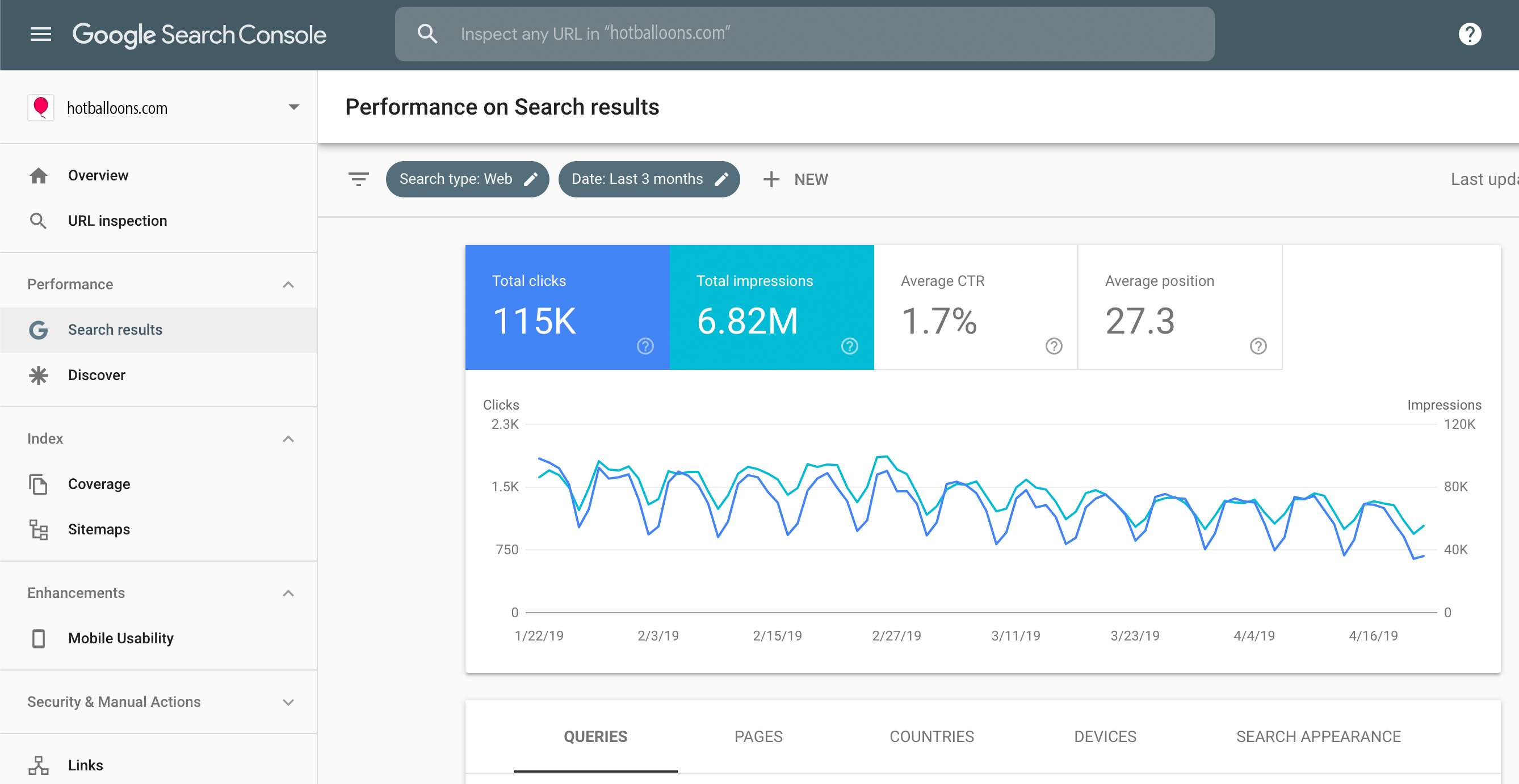
How Keyword Research Can Help You Show Up on Google
Feel like you’ve fixed all the problems on your website, and it still doesn’t stand out on Google? Your lack of ranking may come down to not enough keyword research.
In this post, we’re taking an in-depth look at why keyword research is necessary for strong website search engine optimization (SEO).
Let’s use a balloon company as an example. Hot Balloons has a website but feels it’s missing out on web traffic. The company has fixed its 404 errors, updated its titles and meta descriptions, and refreshed some of its web copy. Now what?

What Is Keyword Research?
One core element of a strong SEO plan that many websites are missing is keyword research. You may think you know which keywords work for your products, but have you done any real research to see if you’re missing out on more important and compelling keywords?
Keyword research boils down to finding the search queries people are typing into search engines to find your website, products, or related topics. The information you find during keyword research can help you rank higher on search engines, which in turn brings more organic traffic to your website. If you’re Hot Balloons, you may be missing out on valuable balloon-related keywords you never thought of!
Since keyword research shows you what people are searching for, it can also show you opportunities for your company’s sales or marketing strategies.
Here are a few essential things to understand about keyword research:
- Depending on the size and diversity on your website, keyword research may be overwhelming. Companies like Amazon have a ton of pages. You can go from buying normal things, like clothes, to really weird stuff, like this squirrel feeder. (Seriously, take a look at it.) Hopefully, your Hot Balloons website isn’t as big – if it were, you probably wouldn’t need the SEO ranking boost, anyway. Take your time, and break up your website into sections if you don’t want to feel as overwhelmed.
- Ranking changes will not happen overnight. There are a lot of factors that determine search rankings, so don’t give up if you don’t see changes after a few weeks. It can take months to inch your way up in search results.
- Keyword research is not a “one and done” deal. The search queries you look at now will not be the same in six months or a year. As your website improves, search engines will feature it for more relevant searches, which can, in turn, give you more insights within your keyword research.

Why Is Keyword Research Important?
Researching why and how people are coming to your site can offer big benefits for your website. Here are a few reasons why you shouldn’t skimp on keyword research:
- Keyword research is the basis for every touchpoint in digital marketing. From email to search engine marketing to content on your site, keywords play an integral role in an organized and successful marketing plan.
- Keyword research offers an in-depth look at what searchers are asking Google. At 9 Clouds, we’re all about metrics. If you can’t measure the performance of a marketing strategy (ahem, direct mailers), we don’t work with it. So why simply guess what people are typing in search queries, when the stats are already there?
- Keyword research improves your SEO rankings, giving you a leg up on the competition. Want to show up higher in search results? Improve your website! One of the best ways to do that is to effectively implement keywords into your pages. With great SEO and keyword research, you can even end up having a featured snippet on Google, like we’ve done.

Where Should I Do Keyword Research?
Keyword research doesn’t have to be hard. There are several free resources you can use to investigate what people are searching to come to your site.
1. Google Suite
Within Google’s platform are several sites that help you find which keywords people use to find you in search.

Google Search Console
If you haven’t set up your site on Google Search Console, we highly recommend you do.
After verifying your website, Search Console looks at what people are typing into the Google search bar before clicking on your site. Perhaps more importantly, it shows the keywords for which you showed up but didn’t get the click.
Why is that important? If you’re Hot Balloons, maybe you are not optimizing for certain products that could give you added sales. In that case, your company wouldn’t have to invest in a new product, but rather work on the products that might not be selling — without putting a ton of marketing dollars behind them. Search Console will show you the clicks and impressions for what people are searching (and maybe not clicking) to let you know where your opportunities lie.
You can also find these stats in your Google Analytics if you have Search Console and Analytics connected. Just go to Acquisition > Search Console > Queries to find the list. If you look in Analytics, you can also see your average position ranking.

Google My Business
Want to improve your local SEO rankings? You can use Google My Business for that.
These metrics are similar to their Search Console counterpart. According to Google:
“[Google My Business] Insights focuses on how customers use Search and Maps to find your listing, and what they do once they find it.”
See some keywords on Google My Business Insights that fit naturally with your website? Use them!

2. Moz Keyword Explorer
This handy tool, which offers both free and paid versions, can help you find keywords in a way similar to the Google tools above.
If you choose to do the free version of Moz Keyword Explorer, you can perform up to 10 queries a month, including the most important query: your website URL.

How Should I Implement Keywords in My Website?
If you don’t use keywords properly, they won’t do much for you. Google and other search engines take into account the bounce rate of a page — and are smart enough to know if you are just spamming a page with a bunch of irrelevant keywords.
Use these tips for implementing keywords in your website.
- Look for placement opportunities to use your keywords. Adding keywords into your website copy is a natural fit, but don’t forget about all the other places you may not think to add keywords.
- But don’t keyword stuff. At one time keyword stuffing was a practice, but not anymore. Find ways to insert the keywords you decide to use into copy that flows and is easy to read. If you choose to stuff as many keywords onto a page as possible, Google will notice and potentially consider it spam.
- Pick a few select keywords for each page. Instead of choosing multiple keywords for one page, hand-select only the keywords that make sense for each page. For instance, “mylar balloon” keywords do not need to be on “latex balloon” pages.
- Find ways to add keywords to your headings. When it makes sense, make sure those keywords are in your headings! Google looks at headings first when crawling your page (as people do when skimming your page), so having important keywords there will help. (But again, remember: no keyword stuffing.)

Outsource Your Research!
Optimizing your website for search engines can be overwhelming. If you want to do it yourself, we created a free SEO eBook to help you figure it out. The eBook is technically written toward auto dealers, but any industry can benefit from these SEO tips and tricks.
Let 9 Clouds take the time and guesswork out of keyword research. Our SEO team works to find keyword opportunities for your website and implements the changes, so you don’t have to.
Show Up With SEO »





